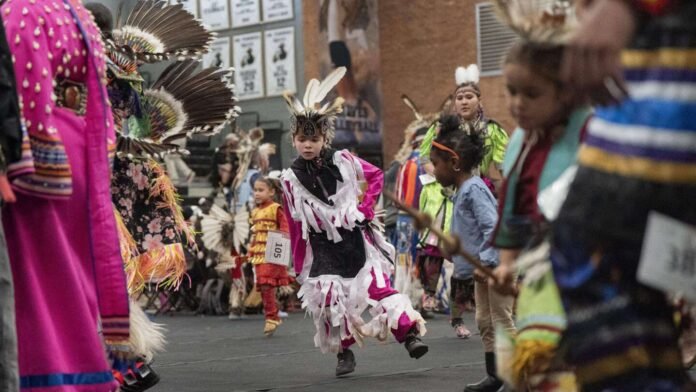Since the 1980s, the Lumbee Tribe has lobbied Congress to acknowledge it as a sovereign nation. There was renewed hope last year when both major party candidates in the presidential election promised to intervene on behalf of the Lumbee.
In his first week in office, President Donald Trump appeared to be making good on his endorsement. He issued an executive order directing the Interior Department to create a plan for federal recognition, a move Lumbee Chairman John Lowery called a “significant step forward.” But several months later, it remains unclear if Trump will take further action.
The plan was submitted to the White House in April, according to the Interior Department. However, a White House official told The Associated Press last week that the Lumbee will have to achieve its goal through legislation — which the Interior Department also confirmed.
“We anticipate the tribe will work with Congress on a path forward to be formally recognized,” Interior spokesperson Elizabeth Peace said in a statement.
Federal acknowledgement comes with a bevy of resources owed to tribal nations through treaty rights and acts of Congress, including health care through the Indian Health Service, access to certain federal grants, and the ability to create a land base such as reservations through the land-to-trust process.
Many of the 574 federally recognized tribes in the U.S. have been acknowledged through legislation. Dozens more have been recognized through the Office of Federal Acknowledgement, which determines if applicants have a documented history of political and social existence as a tribe.
Critics of the Lumbee Tribe, including several tribal nations, argue that it has not been able to prove its historic and genealogical claims and it should do so through the formal federal process. The tribe is recognized by the state of North Carolina.
“The gaps in the Lumbee’s claims are staggering,” said Eastern Band of Cherokee Indians Principal Chief Michell Hicks. He said the Lumbee have yet to show who they descend from and that recognizing them through legislation would open the door for fraudulent groups to gain federal acknowledgement. “Congress wouldn’t be recognizing a tribe, it would be manufacturing one,” he said.
Lowery argues that the Lumbee can prove who they descend from but that the application and vetting process through the Office of Federal Acknowledgement is too long and arduous and could take decades complete. He has been working closely with U.S. Sen. Thom Tillis of North Carolina to pass a bill that would federally recognize the Lumbee Tribe.
“For anyone, from any tribe, to somehow think that a tribe that receives federal recognition via legislation is somehow circumventing the process,” Lowery said, “is being disingenuous.”
The Lumbee Tribe applied for recognition in 1987. But Arlinda Locklear, a Lumbee attorney who has worked on the issue for decades, said staff at the Office of Federal Acknowledgement offered conflicting opinions because a 1956 congressional act acknowledged the Lumbee exist but denied them access to federal resources. She said they asked the office to issue a formal opinion regarding the 1956 bill. “If we’re not eligible then tell us at the beginning so we can ask for it from Congress,” she said.
The Office of Federal Acknowledgement determined the Lumbee Tribe was ineligible for recognition, but that decision was reversed in 2016 by Interior’s Office of the Solicitor. Despite being allowed to reapply since 2016, both Locklear and Lowery said that process remains too lengthy and have opted instead to urge Congress to pass legislation.
That could prove difficult in the current climate, as Trump and Republicans lawmakers are slashing federal spending. In 2011, the Congressional Budget Office estimated that recognizing the Lumbee Tribe and providing the necessary federal resources would cost the U.S. more than $840 million in the first four years. A 2022 CBO estimate put that number at more than $360 million. This month, a Brookings Institution report found that the Trump administration’s directive to freeze federal grants could disrupt $24 billion that go to tribes.
Tillis, the author of the bill, has also been the subject of the Trump’s ire recently, after he voted against the president’s tax bill in June. Trump threatened to campaign against him, and Tillis said he would not seek reelection. His bill, the Lumbee Fairness Act, was referred to the Senate Committee on Indian Affairs in January.
Sen. Lisa Murkowski of Alaska, who chairs the committee, said she will work with Tillis on the bill.
David Wilkins, a Lumbee author and professor at the University of Richmond, has advocated for federal recognition for decades. But, he said the Lumbee face opposition across Indian Country, and he’s concerned that gaining it with Trump’s endorsement will add to that.
“The way he’s battering Indian Country with his cuts or with his layoffs,” Wilkins said. “If we do slip through because Trump convinces his Secretary of Interior to either expedite the acknowledgement process or get Congress to find a move on the Lumbee bill and get it through, I worry about how that’s going to be received in Indian Country.”






